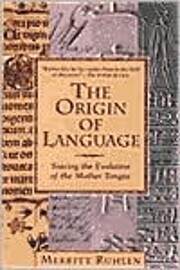

Carregue numa fotografia para ir para os Livros Google.
|
A carregar... The Origin of Language: Tracing the Evolution of the Mother Tongue (original 1994; edição 1996)por Merritt Ruhlen (Autor)
Informação Sobre a ObraThe Origin of Language: Tracing the Evolution of the Mother Tongue por Merritt Ruhlen (1994)
 Nenhum(a) Ainda não há conversas na Discussão sobre este livro.   ) )Very very interesting, marred slightly by being a polemic. The first few chapters, describing how language families are constructed, what the families are, and how the superfamilies are created, are quite fascinating. The later chapters, where the author vents his (probably well-justified) anger at the bulk of the linguistics establishment, are a whole lot less interesting to an outside observer. The points I want to try to remember: * Four African families, with the history appearing to be something like - The Khoi-San group in most places then - A group in Nigeria develop agriculture and spread west then south giving rise to the Bantu group - But there's also a Nilotic group --- what's the deal there? Those are an offshoot of the Bantu guys or what? - In North Africa an Afro-Asiatic group that's Semitic plus others and is presumably the guys who left Africa, established agriculture in the Middle East, then returned to Africa. * Pre-agricultural languages in Europe (a common family? Basque a survivor, likewise Etruscan?) Agriculture moves in (as population expansion, not transmission of the idea) from Anatolia. Still arguments as to how this links up with Indo-European. - Colin Renfrew says these farmers are proto-Indo-Europeans; others say the proto-Indo-Europeans came from north of the Black Sea. - Ruhlen suggests that the first round of proto-Indo-Europeans were the Anatolians who spread up and round Europe, some of whom reached the area above the Black Sea, became aggressive and, in a second wave, swept over what was left of Europe and down into Iran and northern India. * Three Native American language families representing three waves of immigration. - The first, Amerind, populated the entire (at that stage empty) continent. - The second, Na-Dene, populated the west coast, with an offshoot into the US desert area (Arizona, New Mexico, that sort of area) - The third covers the cold Inuit northernmost strip of North America. * When humanity originally left Africa (c 50,000 yrs ago) the most rapid path was along the southern coast of Asia, (perhaps by boat), which allowed for humanity to arrive at New Guinea and Australia surprisingly rapidly. * The wave of people that populated Polynesia started from Taiwan, and while it mostly spread east, it was these same people that populated Madagascar(!) - Things I still don't know about this include when it happened, how this relates to the populations of Phillipines, Malaysia and Indonesia, Melanesia vs Micronesia vs Polynesia, and whether Madasgascar was empty when they reached it. sem críticas | adicionar uma crítica
Just as archaeologists study fossils and ancient artifacts for clues about mankind's origins, linguistic researchers today are sifting through word roots and grammatical conventions and coming up with some startling revelations about our beginnings. In The Origin of Language noted linguist Merritt Ruhlen takes you on a fascinating journey of discovery back through nearly 100,000 years of human history and prehistory in pursuit of the language from which all modern tongues derive. Requiring no prior familiarity with linguistics, The Origin of Language is the first book to explain, in laymen's terms, the controversial process by which linguists are tracing the development of the vast range of human speech, sweeping aside many traditional assumptions about the spread of language and the roots of the human family. In addition to acquainting you with the manner in which such diverse languages as English and Chinese can be compared, Dr. Ruhlen introduces you to the brilliant mavericks whose linguistic theories are at last gaining worldwide acceptance. He also discusses the exciting new work being done in genetics and archaeology that corroborates much of the controversial linguistic evidence. But more than simply describing his and his colleague's theories, Dr. Ruhlen invites you to share in the joys of discovery. He arms you with the linguist's basic tool kit and lets you work through the evidence for yourself and draw your own conclusions. You'll classify languages and language families, trace language family trees, and even reconstruct some of the basic vocabulary used by our most distant ancestors. Also, based on clues provided by your research, you'll plot the land and sea routes most likely taken by early humans in their diaspora out of Africa and to the four corners of the world. While The Origin of Language is an incomparable introduction to some of the most exciting linguistic research now being conducted by researchers around the globe, it is also much more. It is an inspiring invitation to join the quest for our human roots and to hear the echoes of the Mother Tongue. Não foram encontradas descrições de bibliotecas. |
Current DiscussionsNenhum(a)Capas populares
 Google Books — A carregar... Google Books — A carregar...GénerosSistema Decimal de Melvil (DDC)401Language Language Philosophy and theoryClassificação da Biblioteca do Congresso dos EUA (LCC)AvaliaçãoMédia: (3.22) (3.22)
É você?Torne-se num Autor LibraryThing. |
||||||||||||||||||||||||||||||||||||||||||||||||||||||||||||||||||||||||||||||||||||||||||||||||||||||||||||||||||||||||||||||||||||||